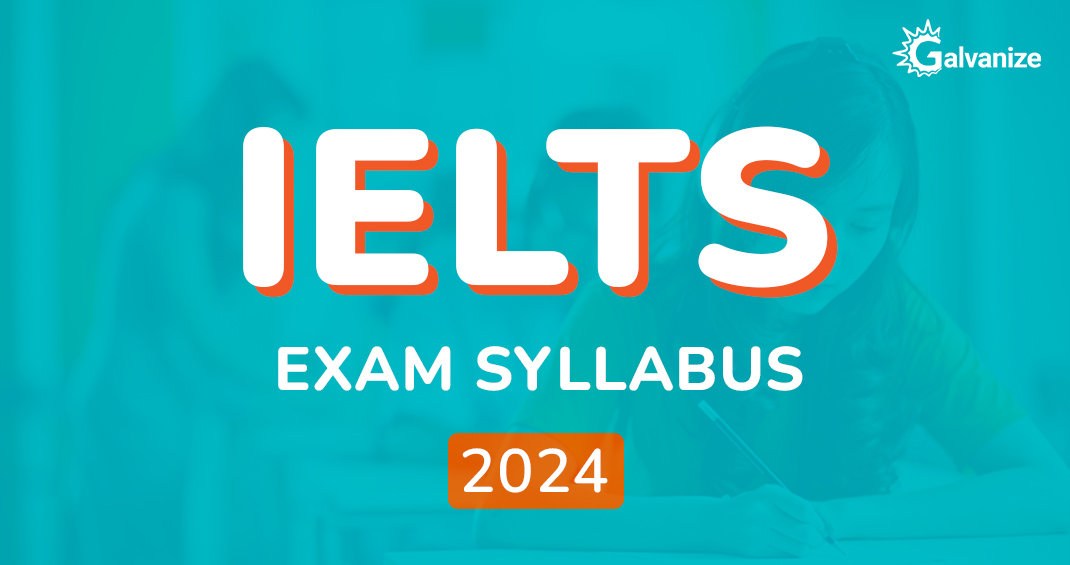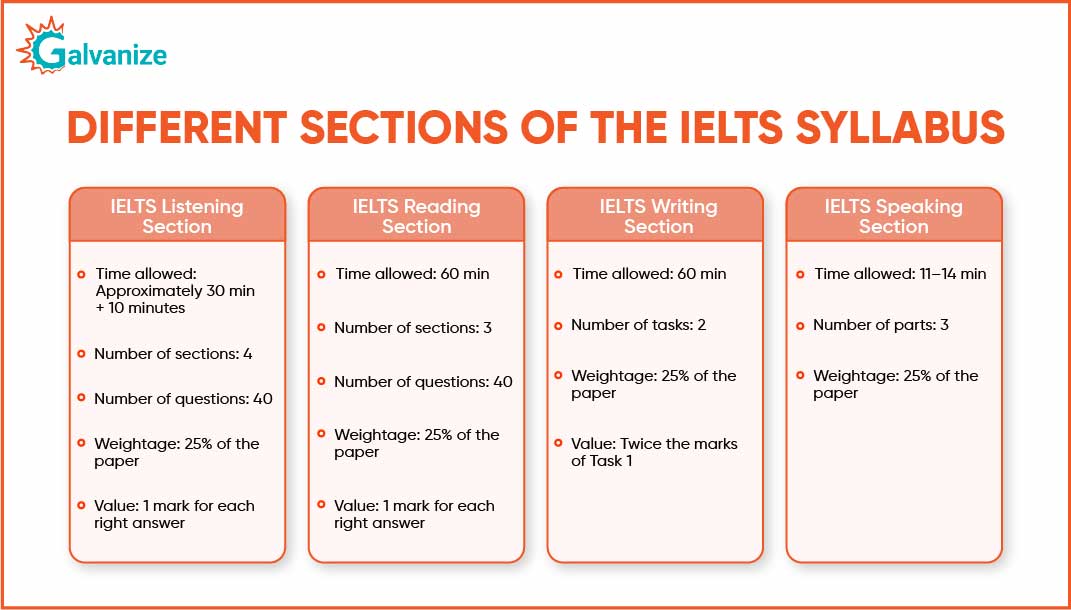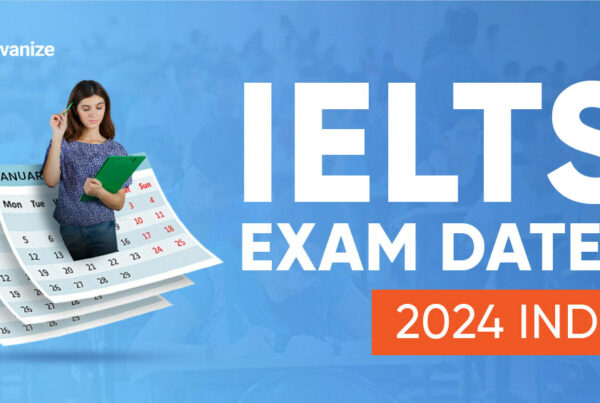
Whether you’re thinking of emigrating to an English-speaking country or studying abroad, the IELTS exam might be the first name that comes to your mind. It is a widely accepted and popular test for verifying English language ability.
However, cracking it needs a proper strategy, and the first step towards it is to understand the IELTS syllabus.
The IELTS syllabus includes 4 sections: listening, reading, writing, and speaking, which examine candidates’ commands over the English language. The test has multiple versions designed specifically for academic purposes and general reasons.
According to the requirements, candidates can choose which type of IELTS test they want to appear for, understand the specific IELTS test syllabus and prepare accordingly.
In this blog, we’ll discuss the IELTS exam syllabus 2024 in-depth, including its various types, sections and difficulty levels.
Types of IELTS Exam Syllabus
#1. IELTS General Training Test Syllabus
The IELTS general training test syllabus is designed to assess the everyday English language skills of the candidates, important for social situations and workplace environments.
The test pattern is suitable for various purposes such as migrating, work experience, training, and studying at a School/college below graduation level in an English-speaking country, Australia, Canada, New Zealand, and the UK.
The IELTS general training test syllabus combines 4 sections: listening, reading, writing, and speaking, to evaluate applicants.
#2. IELTS Academic Training Test Syllabus
The IELTS Academic Training Test Syllabus is designed for candidates who want to pursue higher education like graduation or post-graduation level in an English-speaking country.
The test evaluates if the candidate is capable enough to begin studying in English by examining the candidate’s listening, reading, writing, and speaking skills.
However, the IELTS academic training test syllabus ‘reading and writing sections differ from the IELTS general training test.
#3. IELTS Life Skills Tests Syllabus
The IELTS Life Skills test is a special UK government-approved Secure English Language Test (SELT) which only evaluates candidates’ listening and speaking skills. Its syllabus involves small discussions over everyday subjects such as work, transport and the weather to examine the candidates’ ability to communicate in the UK.
The test can be of different levels for different purposes: family visa extension to family (level A1), spouse or partner visa (level A2), Indefinite leave to remain or citizenship in the UK (level B1).
IELTS doesn’t provide SELT test results in marks but either pass or fail. The SELT syllabus difficulty level changes with the change in level.
Different Sections of the IELTS Syllabus
The IELTS exam syllabus, consisting of 4 sections: listening, reading, writing, and speaking, is designed in such a way that it evaluates candidates’ overall expertise in the English language.
The test scores help universities, colleges, employers, and associations to select the right candidates for their organizations.
In addition, the test offers applicants the opportunity to prove their ability to sustain and build their life and career in English-speaking countries.
 1. IELTS Listening Section
1. IELTS Listening Section
The IELTS Listening paper consists of four parts, and each of them includes 10 questions. The first part and second part deals with everyday social situations, and the 3rd and 4th part is about educational and training situations. The 1st and 3rd parts are a conversation between two speakers, and 2nd and 4th parts are monologues.
To score well in this section, candidates must enhance their listening skills and understand different accents, including British, Australian, New Zealand and North American.
For this section, candidates get 30 minutes for listening and 10 minutes for transferring their answers.
2. IELTS Reading Section
The IELTS reading part comprises 3 sections of total text length between 2150–2750 words and 40 questions to answer out of the passage. The first section of the test focuses on everyday information from notices and advertisements; section 2 covers work topics like job descriptions and contracts; section 3 deals with general interest topics like any descriptive article taken from newspapers, magazines or books in the general IELTS syllabus.
In the IELTS Academic training test, the multiple texts come from books, journals, magazines, newspapers and online resources, which is of general interest to students at the undergraduate or postgraduate level. The texts can be narrative, descriptive or discursive/argumentative or include technical vocabulary, diagrams and graphs.
To score well in this section, candidates must practice reading and understanding the long-form text. Moreover, they should also be able to manage their time effectively. They get only 1 hrs to read and transfer the answer for this section.
3. IELTS Writing Section
Like the IELTS reading section, the writing section also differs for general and academic IELTS text. It includes two tasks in the IELTS syllabus.
In general, IELTS Task 1 asks candidates to write a letter on a given topic of at least 150 words in 20 minutes. In academic IELTS, candidates are asked to describe some visual information in their own words (a graph, table, chart or diagram). Task 2 in both tests deals with explaining any given point of view, argument or problem in at least 250 words in about 40 minutes.
To score quality marks in this section, candidates need to practice writing in paragraphs, as the test expects candidates to write answers in full sentences, not in bullets or points.
4. IELTS Speaking Section
This section is a face-to-face interview that includes three parts. In the first task, you need to speak about yourself or any familiar topics. In the 2nd task, you will be asked to talk about any particular topic written on a card for up to 2 minutes and in part 3, the examiner will ask some questions about the topic in detail.
It’s the shortest action of length approx 11–14 minutes. To get a good score in this section, you must practice speaking English fluently over various IELTS speaking topics.
IELTS Exam Syllabus: Understand in a Glance
| Test Section | Time Allotted | Sections/Parts | Number of questions |
| Listening | 30 minutes + 10 minutes |
Sections 1: Conversation Section 2: Monologue Section 3: Conversation Section 4: Monologue |
40 |
| Reading | 60 minutes |
Sections 1: Everyday Information Section 2: Work Description Section 3: Complex Article (in general) Multiple Text in Academic |
40 |
| Writing | 60 minutes |
Task 1: Describe data ( in academic)/Write a letter (In General) Task 2: Essay |
2 |
| Speaking | 11–14 minutes |
Part 1: Background Part 2: Topic Part 3: Discussion |
Multiple |
Difficulty Level of IELTS Exam
IELTS is a standard exam for the English language. Since it covers various aspects like reading, listening, writing, and speaking, the difficulty level can change from person to person. You may be good at speaking, but your listening skills are not good. Similarly, you could be better in reading and understanding but not in writing or vice versa.
So, proper IELTS test preparation is important to tackle the difficulty of IELTS. Work on the section, which you find more difficult or you are under confident in. Additionally, learned time management, as each section has allotted time to solve the questions. Read vocalaries, practice essay writing, enhance your speaking skills, listen to various English accent speeches and solve the questions.
Conclusion
IELTS is a crucial step to turn your dream of studying abroad, living in foreign states, or getting work visas into reality. Its syllabus, which examines student’s various approaches, is important to tackle well in the exams. Study abroad institutes such as Galvanize help you prepare for the leading English test, IELTS, and also provide personalized help in selecting the IELTS types as per your requirements.
FAQs Related to IELTS
Is IELTS pattern changed in 2023?
No, the International English Language Testing System (IELTS) has not made any changes to the IELTS syllabus and exam pattern in 2023. It continues to follow four sections, reading, listening, speaking, and writing, to evaluate candidates’ reading, listening, speaking, and writing skills, respectively.
Is IELTS hard to pass?
IELTS has some difficulty levels, as it covers multiple sections and skills. But it’s not difficult to pass. With practice and proper preparation, you can score in the exam.
Can I crack the IELTS exam in 3 months?
Yes, you can crack the IELTS exam in 3 months easily. However, it depends on multiple factors, like your current level of command over the English language, consistent practice, and preparation. Generally, it takes 1-2 months to get band 6.0 to the candidates and 8-12 months to achieve band 7.0 if candidates start from band 5 or 5.0. You can reduce the preparation time by taking up any good classes for IELTS preparation.
Is 7 IELTS Score easy?
The IELTS exam is scored with the Band score. So, when it comes to scoring 7 in IELTS, you will be required to get an average of 7 in each section of reading, speaking, writing, and listening.
Can I prepare for IELTS at Home?
Yes, the abroad study institute provides self-paced preparation courses for the IELTS exam. You can join such courses to prepare for IELTS at home.
Have more questions. Read IELTS FAQs.










